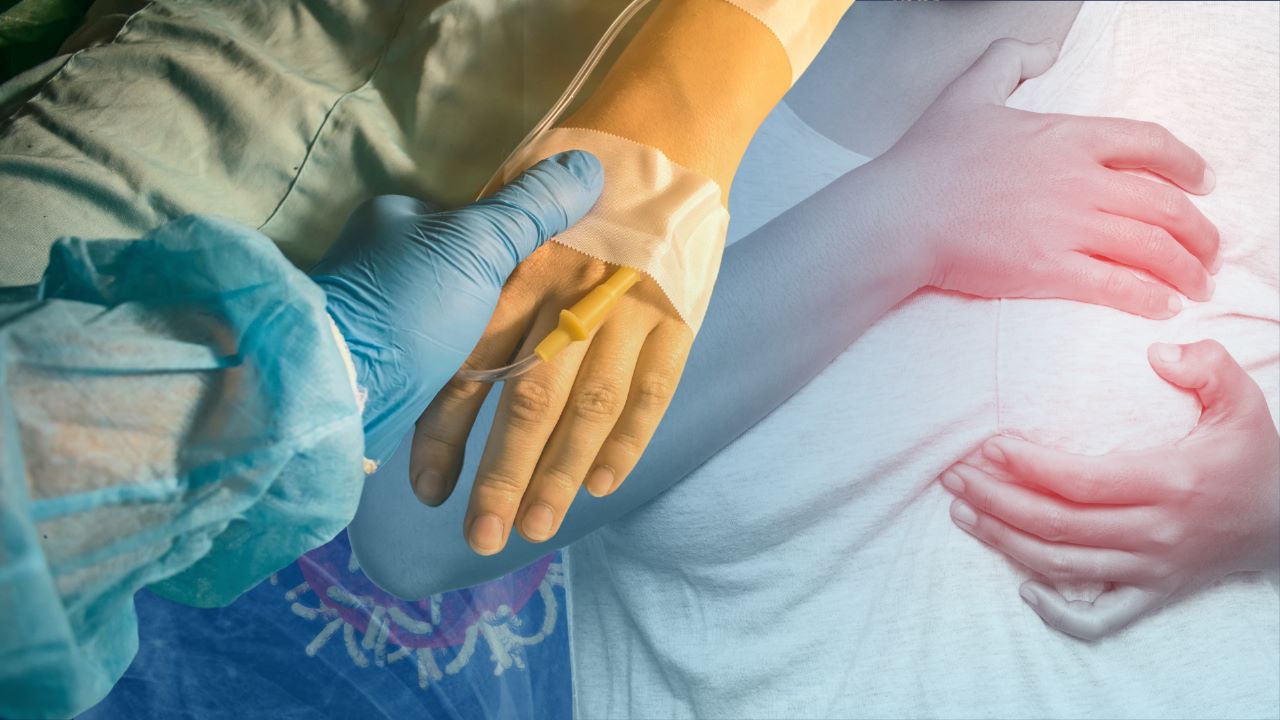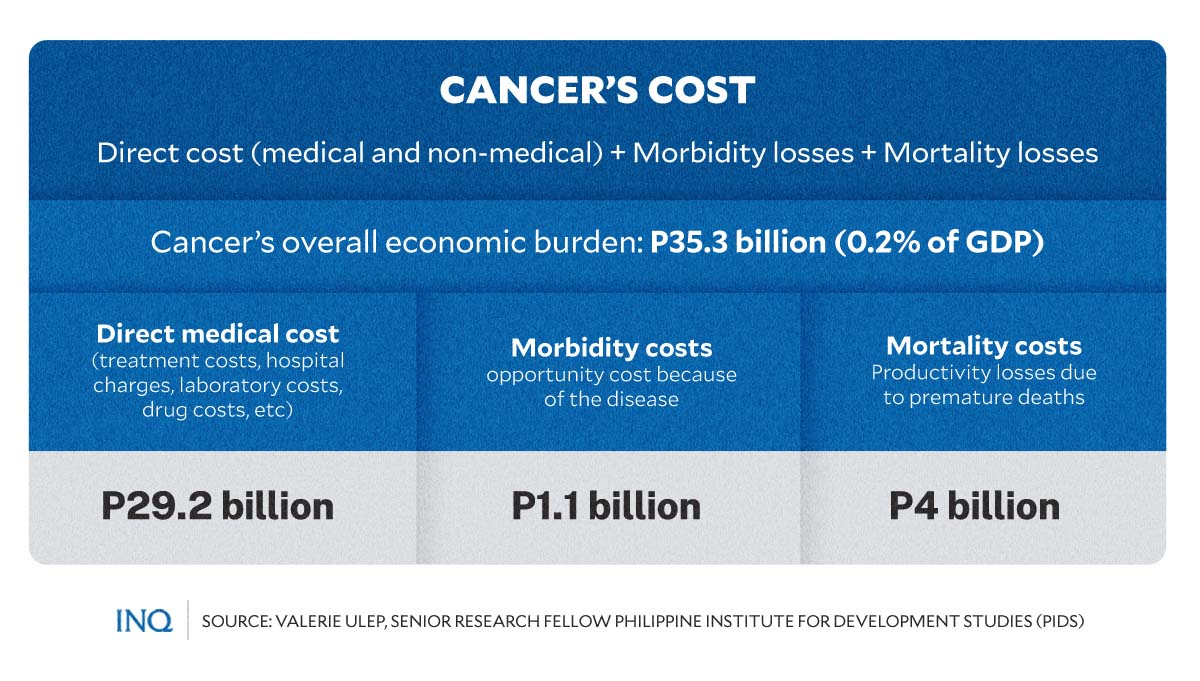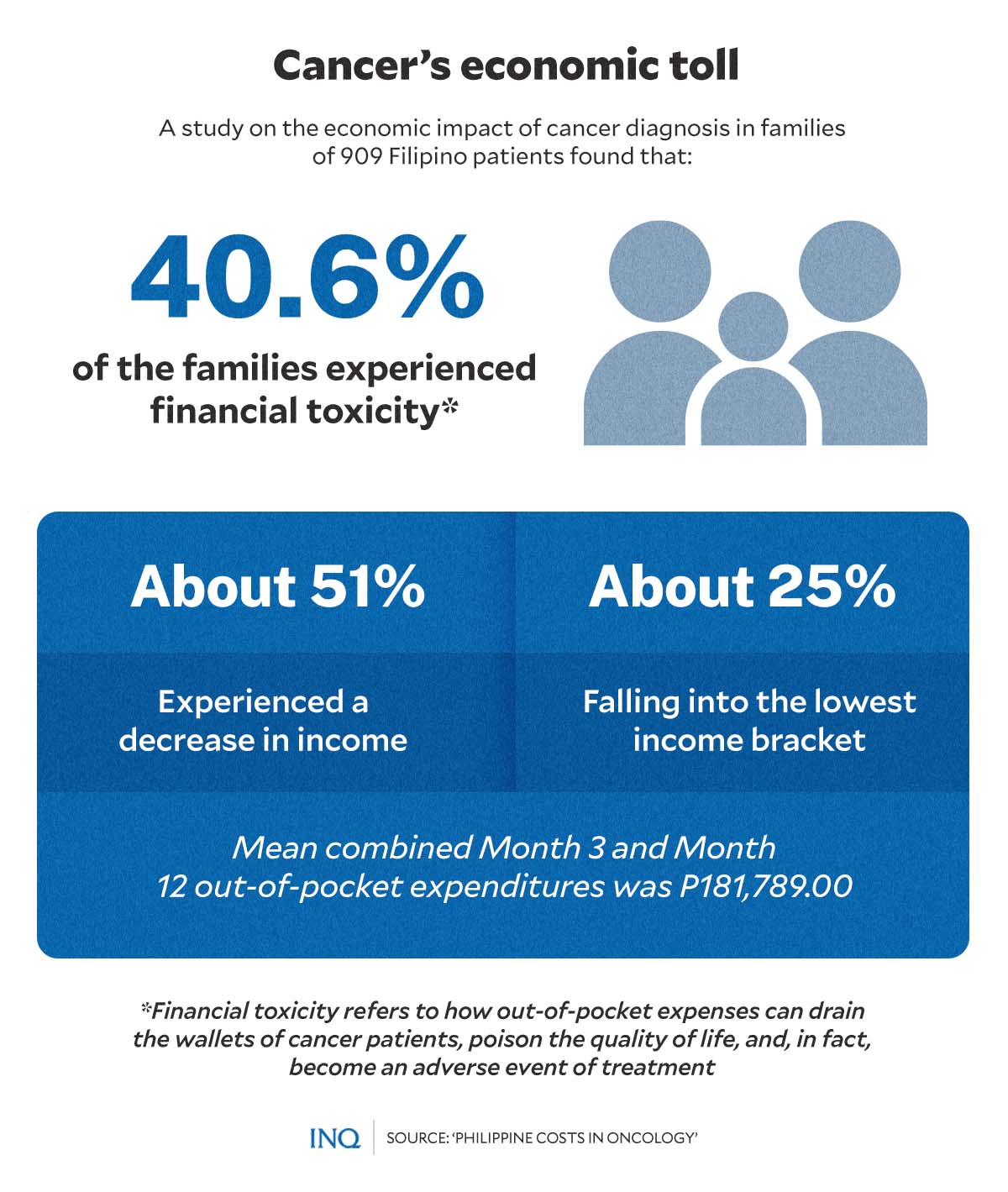Roadblocks keep better treatment out of breast cancer patients’ reach
(First of two parts)
MANILA, Philippines—Targeted therapy, which has been available in the country for years, holds promise as a more effective way of treating cancer. However, certain barriers limit many breast cancer patients’ access to it.
Aside from standard treatment options—chemotherapy, hormone therapy, and immunotherapy—another kind of breast cancer treatment called targeted therapy is being offered to patients worldwide—including those in the Philippines.
According to the Philippine Cancer Society, targeted therapy uses drugs that work differently than standard chemotherapy drugs and often have different or less severe side effects. Among the prescribed targeted cancer drugs are trastuzumab, lapatinib, and bevacizumab (generic names).
In a radio interview on Tuesday (June 14), Kasuso Philippines Foundation for Breast Care Inc. volunteer Aileen Antolin explained that unlike chemotherapy, which targets cancer and possibly even non-cancer cells, targeted therapy focuses only on eliminating cancer cells.
“What we used to know is the typical chemotherapy, which causes side effects such as balding or extreme hair loss, fatigue, and difficulty in recovering after treatments,” Antolin said in Filipino.
“What’s good with targeted therapy is that it has no side effects. Patients don’t experience major hair loss. They don’t [feel sick] after their treatment,” she added.
In the Philippines, targeted therapy has been an available treatment option for breast cancer patients since 2011. Antolin said there has been “great success” in terms of the prognosis of breast cancer patients who received the treatment.
Unfortunately, while it has existed in the country for some time now, not all breast cancer patients have access to targeted drugs—especially impoverished patients who rely mostly on government programs.
Factors hindering access to treatment
According to Antolin, among the possible reasons that access to targeted therapy and innovative drugs for breast cancer remains limited for many patients are high costs and the process of issuing licenses for these medicines before doctors can prescribe them.
“We have this thing called the essential medicines list. This list includes medicines available in our pharmacies that the doctors can prescribe. But before [these medicines] can be included in the list, a law should cover it,” she explained.
“[These medicines will also undergo] regulation. Our country’s regulating body will approve those drugs first,” she added.
Last month, Philippine Society of Medical Oncology (PSMD) president Dr. Rosario Pitargue called on the government to prioritize and fast-track the inclusion of new cancer drugs in the Philippine National Drug Formulary (PNDF).
“These are the drugs that we really need to be able to help our patients,” she said.
Pitargue explained that the process for including these medicines would need approval from the Health Technology Assessment Council and would take one to three years.
Dr. Kenneth Samala, a medical oncology fellow at the University of the Philippines-Philippine General Hospital (UP-PGH), noted that new cancer medicines should be included in the PNDF first before the Department of Health (DOH) can procure them for the government’s cancer control program.
Samala previously said that they had already applied various cancer medicines to be added to the formulary, “but nothing happened.”
READ: Access to new cancer medicines remains limited for poor patients—experts
In fact, Antolin shared that when trastuzumab—a targeted cancer drug—entered the country, it was not immediately made available through the government’s Breast Cancer Medicine Access Program (BCMAP).
“It was not included in the free chemo program of the government because it is so expensive,” said Antolin.
“It was only in 2016 or 2017 when it was included in the access program. Still, the high cost remained a huge factor. The requirement of supply versus demand of patients who need it is not immediately met,” she added.
According to data from the Department of Health’s (DOH) Drug Price Reference Index, a 600 mg/5 mL vial of trastuzumab costs approximately P26,000.
A 2019 study published in the BMC Health Services Research detailed that revolutionary therapies such as trastuzumab have been listed in the PNDF since 2008, “but with no current evidence yet on its value for money to date.”
“Hence, despite several policy enablers, its accessibility remains to be limited as the current government insurance case rate for breast cancer does not cover the treatment for HER2-positive type; public hospitals cannot afford to procure and make it available in their facilities due to its high cost; and, while it has been recently included in the list of subsidized medicines under the DOH Breast Cancer Medicine Access Program (DOH BCMAP) under a negotiated reduced price for national hospitals, the access sites and medicine stocks are limited.”
READ: Cost-utility analysis of adjuvant trastuzumab therapy for HER2-positive early-stage breast cancer in the Philippines
Patients ‘deprived’
When asked whether the roadblocks that limit access to innovative cancer drugs somewhat deprive many breast cancer patients, Antolin agreed, stressing that many impoverished patients will benefit from making those drugs available and affordable through government programs.
“I guess so. We can say that not making it available to patients is also depriving [them], especially since most of the patients who will benefit from it are poor and are availing programs under the public healthcare system,” she said.
“Those patients are also the ones who will benefit the most from the medicines that will be recommended and prescribed by doctors based on the essential medicines,” she added.
While Antolin noted that cancer affects everyone regardless of their financial capabilities, she emphasized that there is still a gap between the treatment and opportunity offered to privileged people.
“Those who have money can purchase cancer medicines overseas. Meanwhile, indigent patients who are reliant on the public health care system can’t do anything,” she said, adding that even doctors’ hands are often tied.
Statistics revealed that at least 7 in 10 cancer patients in the country “drop out of treatment regimen” due to lack of funds.
In the Philippines, the cost of cancer treatment can range from ₱120,000 to as much as over ₱1 million. The estimated chemotherapy cost per session, depending on the cancer type, starts at ₱20,000 up to over ₱120,000.
READ: PH cancer patients lack access to preventive screening, costly treatment
At the UP-PGH, which serves around 60,000 to 70,000 cancer patients in a year, Dr. Jorge Ignacio, oncologist and chair of the UP-PGH Cancer Institute, estimated that at least 40,000 cancer patients are poor.
“We still rely on chemotherapy because this is, in a way, affordable,” Ignacio said, stressing that indigent patients would not be able to avail themselves of the new cancer medicines that are more expensive.
A study published in 2018 in Acta Medica Philippina—a peer-reviewed general medical and health science journal published by the University of the Philippines (UP)—highlighted the economic impact of cancer diagnosis in families.
The study, which analyzed 909 cancer patients in the Philippines, found that 40.6 percent of cancer patients’ families experienced financial toxicity—or financial problems—due to the high cost of medical care.
The researchers also found that the mean combined out-of-pocket expenses of respondents at 3 and 12 months after diagnosis amounted to ₱181,789.00.
READ: ‘Financial toxicity’ hurting PH cancer patients
(Next: Revisit PH cancer programs, budget remains an issue.)



